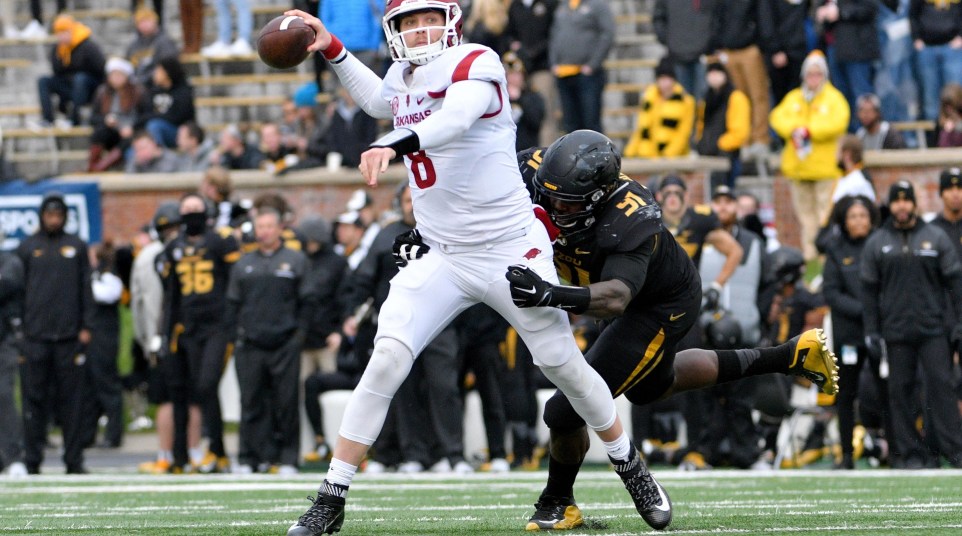
Position Edge: Arkansas vs. Virginia Tech
The Arkansas Razorbacks have had to wait more than a month to redeem themselves following a frustrating and embarrassing loss to the Missouri Tigers in their regular season finale.
On Thursday, the Hogs will look to end their season on a high note when they meet No. 22 Virginia Tech, of the Atlantic Coast Conference, in the Belk Bowl on ESPN at 5:30 p.m. EST.
Both Arkansas (7-5) and Virginia Tech (9-4) possess plenty of talent, so fans can expect a tight game in this ACC-SEC clash.
Here’s a look at how the Razorbacks and Hokies match up:
WHEN ARKANSAS HAS THE BALL
QB Austin Allen vs. Virginia Tech pass defense: During the offseason, many wondered what the Razorbacks would have in Allen, who replaced his older brother, Brandon, under center this year. Ultimately, the signal-caller was impressive during his debut season.
In fact, Allen was among the best quarterbacks in the SEC. He finished second in the conference in both passing yards (3,152) and touchdown passes (23), despite being sacked more than any other SEC quarterback (29 times).
The Hogs average 219.3 passing yards per game, and the offense should be able to attack the Hokies, who surrendered 194.2 per game, through the air. The key to this matchup will be which unit makes more big plays.
Virginia Tech picked off 13 passes and sacked opposing quarterbacks 26 times. Neither of those stats bode well for the Razorbacks, though Allen has plenty of talent to work with on the outside if the offensive line gives him time.
EDGE: Arkansas
RBs Rawleigh Williams III and Devwah Whaley vs. Virginia Tech run defense: Williams was among the best running backs in the SEC this season, finishing with 1,326 yards and 12 touchdowns.
Whaley, a true freshman, was a pleasant surprise for Hogs fans, recording 601 yards and three scores on the ground. As good as the freshman was, however, it’s Williams who must set the tone against the Hokies.
Although Virginia Tech has Woody Baron, who ranked fifth in the ACC with five tackles for loss, anchoring the defensive line, the defense still allowed opponents to run for 148.5 yards per game. The Hokies also surrendered 21 touchdowns on the ground.
As good as Baron is, Williams and Whaley should pick up yards in bunches.
EDGE: Arkansas
Arkansas WRs vs. Virginia Tech DBs: If it weren’t for the Razorbacks’ receivers, Allen wouldn’t have been so spectacular during his first year at quarterback.
With Drew Morgan (664 yards, 3 TDs), Keon Hatcher (638 yards, 7 TDs) and Jared Cornelius (515 yards, 4 TDs), the Hogs have three rock-solid pass-catchers. And don’t forget about tight end Jeremy Sprinkle — he finished with 380 yards and four touchdown catches of his own.
The Hokies might have a talented secondary, but the Razorbacks will have no excuse if their loaded group of receivers struggle to get open.
EDGE: Arkansas
WHEN VIRGINIA TECH HAS THE BALL
QB Jerod Evans vs. Arkansas pass defense: Evans made an immediate impact when he took over as the Hokies’ quarterback this season, throwing for 3,309 yards and 27 touchdowns with only seven interceptions.

Credit: Logan Bowles-USA TODAY Sports
The Razorbacks, meanwhile, picked off nine passes and allowed opposing quarterbacks to throw for 219.3 yards per game. Considering Virginia Tech registered 263.3 passing yards per game, it’s hard to picture a scenario where the Hokies don’t amass more than what Arkansas usually allows.
Even though Evans may struggle to get into the end zone through the air — the Razorbacks only gave up 10 touchdown passes all season — the quarterback still should be able to move the chains.
EDGE: Virginia Tech
Evans/ RB Travon McMillian vs. Arkansas run defense: Not only is Evans dangerous when he drops back to pass, the Hokies’ signal-caller can also use his legs.
He led Virginia Tech with 759 rushing yards and 10 touchdowns, while McMillian ran for 637 yards and six touchdowns at running back. The Hokies rushed for 184.9 yards per game.
The Razorbacks struggled to stop the run, allowing opponents to run for 209.3 yards per game. Arkansas also gave up a whopping 36 rushing touchdowns.
Knowing it can be difficult to score on the Razorbacks through the air, expect the Hokies to pound the football between the tackles inside the red zone. Ultimately, I think the Hogs’ run defense will struggle, especially against another mobile quarterback.
EDGE: Virginia Tech
Virginia Tech WRs vs. Arkansas DBs: Like Arkansas, the Hokies boast a phenomenal crop of receivers. Isaiah Ford leads the way with 1,038 yards and seven touchdowns on 73 receptions. However, Ford isn’t the only pass-catcher Virginia Tech has capable of making big plays — Cam Phillips and Bucky Hodges are both deadly on the outside.
Phillips registered 868 yards and five touchdown catches, while Hodges has 640 receiving yards and seven touchdowns on just 43 catches.
Josh Liddell, Henre’ Toliver and Ryan Pulley helped solidify Arkansas’ secondary, which was a major question mark for the Razorbacks after a slew of injuries struck the unit before the start of the season. Still, even if Arkansas’ defensive backs have played well, Virginia Tech has too many weapons outside.
EDGE: Virginia Tech
SPECIAL TEAMS
Neither team is particularly stellar in this area, especially in the kicking game.
Arkansas pulled kicker Cole Hedlund for Adam McFain, who was actually pretty good for the Hogs, making 8-of-10 field goal tries. The only knock on McFain is he has made only 50 percent of his attempts from beyond 40 yards (2-for-4).
Virginia Tech kicker Joey Slye went 20-for-26 this year and made all but one of his 54 extra-point tries. Although he is a lock from 29 yards or closer, Slye has made just one of six attempts from 40 yards or deeper.
Considering the Razorbacks average 44.7 yards per punt compared to the Hokies’ 38.8 average, I’m giving the nod to the Hogs.
EDGE: Arkansas
